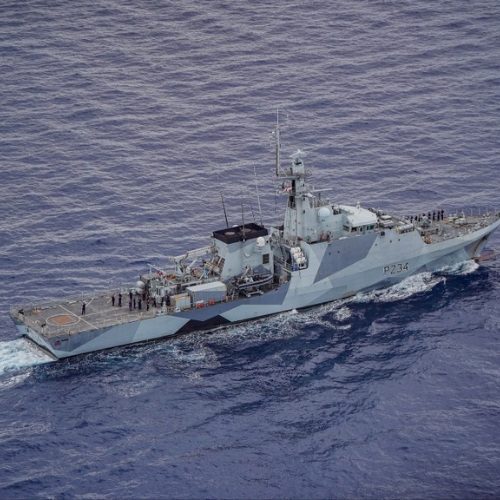The UK has sent one of its Royal Navy ships HMS Spey to the seas near Japan. This mission is not for war, but for watching and stopping illegal actions happening on the water. These illegal acts involve North Korean ships breaking rules set by the United Nations (UN). The ship sent by the UK is called HMS Spey, and it’s a special patrol vessel that is used to observe and monitor activity at sea.
This move is part of an ongoing effort by the international community to stop North Korea from secretly trading goods and fuel on the ocean. These illegal trades are known as “ship-to-ship transfers”, where goods are moved from one ship to another without going through proper checks. The UN banned these actions because North Korea has been using them to get around international rules that were put in place to stop its dangerous weapons programs.
The ship HMS Spey started its mission earlier this month, sailing in waters close to Japan. It is watching carefully for any North Korean ships that might be trying to transfer fuel, coal, or other goods at sea — especially in ways that are hidden or not allowed. Japan’s government said they support the UK’s action and thanked them for helping to carry out the UN rules. Japan also said that these activities are important for making sure that North Korea cannot continue to build and test dangerous weapons like missiles.
This is the 13th Time the UK Has Taken Part
This isn’t the first time the UK has taken part in these kinds of patrols. In fact, the HMS Spey has been involved in similar missions before. This recent deployment marks the 13th time since 2018 that a British Navy ship has taken part in operations to check on North Korean activity at sea.
Just last year in June, the same ship, HMS Spey, was sent on a similar mission. A month earlier, in May, it had even worked together with South Korea’s navy to watch for illegal ship-to-ship movements. Countries like the United States, Japan, Australia, France, Germany, Italy, and New Zealand have also been part of these efforts. They’ve been sending ships and aircraft to help watch and stop North Korea’s secret sea trades.
UK Steel Tariff Break Tied to China-Free Supply Chains—Trump’s Hidden Clause Revealed
The reason for all this effort is simple. The UN set rules in 2017 to stop North Korea from sending or receiving certain goods, especially items like oil, coal, and seafood. This was done through UN Security Council Resolution 2375, which says that North Korea is not allowed to carry out ship-to-ship transfers and cannot export many goods. However, despite these rules, North Korea has continued to find ways to break them.
One of the main ways they do this is by quietly meeting up with other ships out at sea, far from the coast, and transferring goods. These acts are hard to track without constant monitoring from air and sea patrols. That’s why these joint missions and surveillance actions are so important.
North Korea and China Push Back Against These Efforts
North Korea has always refused to accept these rules. It claims that the international sanctions are unfair and are only meant to harm its country. North Korean officials often speak out against the patrols by other countries and say they are a threat to their freedom.
Not only that, but China has also shown strong disagreement with these monitoring activities. In some cases, Chinese forces have interfered with patrol missions. For example, there were reports that Chinese forces bothered an Australian helicopter and a Canadian surveillance aircraft during similar missions. China has even accused foreign patrols of entering its airspace during these operations.
Caught Red-Handed: Russia and North Korea Accused of Secret Weapons Pact Breaking UN Sanctions
Earlier, these patrol missions were reported in detail by a group called the UN Panel of Experts. This group used to share evidence showing how North Korea was breaking the rules. But last year, Russia used its power to stop the group’s work by voting against its renewal. As a result, a new team was formed by countries like the US and its allies, called the Multilateral Sanctions Monitoring Team. However, this new group’s first report did not directly include evidence from ship patrols like those done by the UK’s HMS Spey.
Despite these challenges, countries continue to work together to keep watch on the sea and try to stop North Korea from secretly trading in ways that go against international laws. The deployment of HMS Spey shows that the UK is still strongly committed to helping with this important task.


